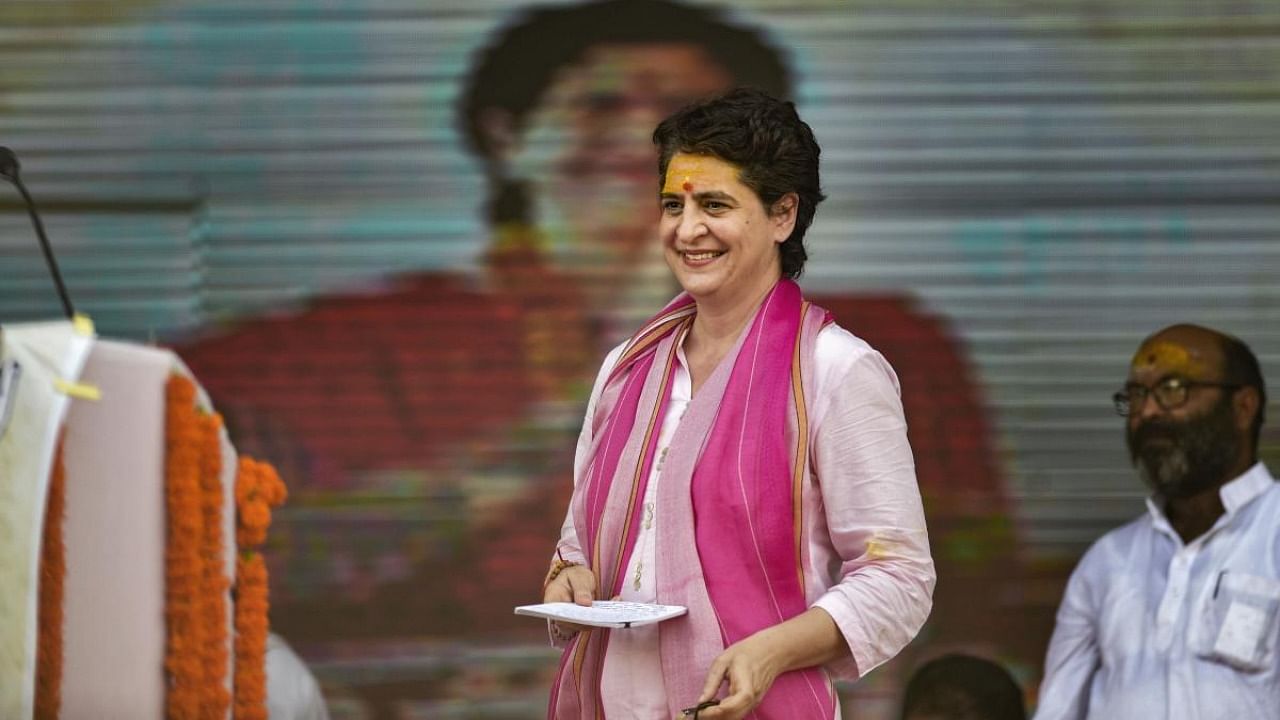
There must have been a time when the phrase "women's empowerment" conveyed the intended and worthy meaning of those two words. Not anymore. Its indifferent and random use by misogynists of all stripes, including politicians, has drained the phrase of any significant meaning. In fact, women's empowerment has largely come to be understood as a countervailing instrument to feminist ideology. It has come to signify containment, rather than autonomy or transformation of the lives of women.
Against this backdrop, Congress general secretary Priyanka Gandhi's announcement that her party will field 40 per cent of women candidates in the forthcoming Uttar Pradesh elections is loaded with implications and possibilities. "I have taken this decision for women's empowerment. There is no other political motive, agenda behind this decision," she said. If her use of the hackneyed phrase does not exactly inspire hope, Priyanka Gandhi's further elaboration that "women may not consolidate as a separate voting bloc in this election, they might consolidate in the next election or some time in the future" merits a closer look.
This shift in electoral strategy raises the question: How does the Congress propose mobilising women in a state ridden with patriarchy, caste, violence, institutional failure? Breaking away from the mire of caste-based politics can, undoubtedly, open up interesting possibilities—political and social. But a quota in itself, while ensuring greater political representation, may not carve out a vibrant constituency of women capable of seeking greater political and social autonomy. Identity-based constituencies, as we have seen in the case of caste, tend to be dragged into feeding narrow political and electoral interests rather than a socially transformative vision.
Keeping in mind that party-based gender quota is not entirely a novel idea is important in this context. Bengal's ruling Trinamool Congress (TMC) and its Odisha counterpart, Biju Janata Dal (BJD), have reaped substantial electoral benefits by fielding a large number of women in elections and giving them political visibility. The contexts, however, are different in the states under discussion: The TMC and BJD are in charge of state governments, commanding resources and power to implement policies they want or deem beneficial. On the other hand, the Congress is a weak force in UP, struggling to resurrect itself from the margins of politics.
Launched two years after Mamata Banerjee came to power in Bengal, the Kanyashree scheme based on conditional cash transfer to girls incentivises women to stay in school and delay marriage. A huge draw for women, the scheme has created a constituency of subaltern women who have remained loyal to Banerjee. This year's hard-fought assembly polls saw such women, especially from lower socio-economic strata, rallying behind Banerjee and contributing substantively to her third consecutive electoral triumph.
But any kind of identity-based electoral mobilisation, especially if successful, usually tends to be reduced to a poll-expedient vote bank, which politicians can manipulate at will. Most political parties walk a narrow path, keeping women within the boundaries of electoral politics and not raising issues that challenge dominant and regressive cultural norms. In that sense, it needs to be underlined that electoral power is just one of many routes to empowering women. If Priyanka Gandhi's idea of women's empowerment is to make a mark, she needs to expand the ambit of that call beyond a captive gender-based vote bank.
In the long run, any form of empowerment that does not touch everyday social and personal conflicts women deal with will turn out to be varnish on the surface. This is a country where women are frequently pilloried for what they wear, who they marry or don't, where women face high levels of violence in public and private spaces, where the birth of daughters is all too often unwelcome. Remembering that sordid reality is important in drawing up and implementing any political strategy if it is to touch women's lives.
Recalling the 73rd Constitutional amendment of 1993, sanctioning 33 per cent reservation of seats for women in local panchayat bodies, may be interesting in this context. Getting off to a shaky start, the scheme initially saw male household members of elected women representatives calling the shots from the driver's seat. But over a period of time, those tendencies gave way to women leaders at the grassroots asserting and exercising autonomy in village governance. They made independent decisions in a range of important matters, especially relating to matters impacting the quality of everyday life like education, sanitation, water, and fuel. Equally, one must remember it is the reluctance of the political class (without exceptions) that has shunted the women's reservation bill, granting 33 per cent gender-based reservation in Parliament and state assemblies for over two decades.
In this context, Priyanka Gandhi has made an interesting move by attempting to inject a new element into UP's violent, masculinist political landscape. Under Chief Minister Yogi Adityanath, the state has lurched from one crisis to another. From Hathras to Lakhimpur Kheri, the narrative of UP politics is marked and dominated by violence. Indeed, the sprawling state has a history of political volatility and violence. But never before has it climbed such heights. Or received such political sanction—overt and covert.
The Congress has an opportunity to reach out to UP's women not just as voters but also as citizens, to start a conversation few political parties do. Politics, electoral or otherwise, is like other spheres of life in India, dominated by men; often used to browbeat women. It will be interesting to see if Priyanka Gandhi can break the stillness among that constituency and start a process of changing gender-based power relations in private and public spaces. One suspects, however, that to do that, she and her party will have to go further than electoral representation.
(Monobina Gupta is the author of 'Left Politics in Bengal' and 'Didi: A Political Biography')
Disclaimer: The views expressed above are the author's own. They do not necessarily reflect the views of DH.
Watch latest videos by DH here: